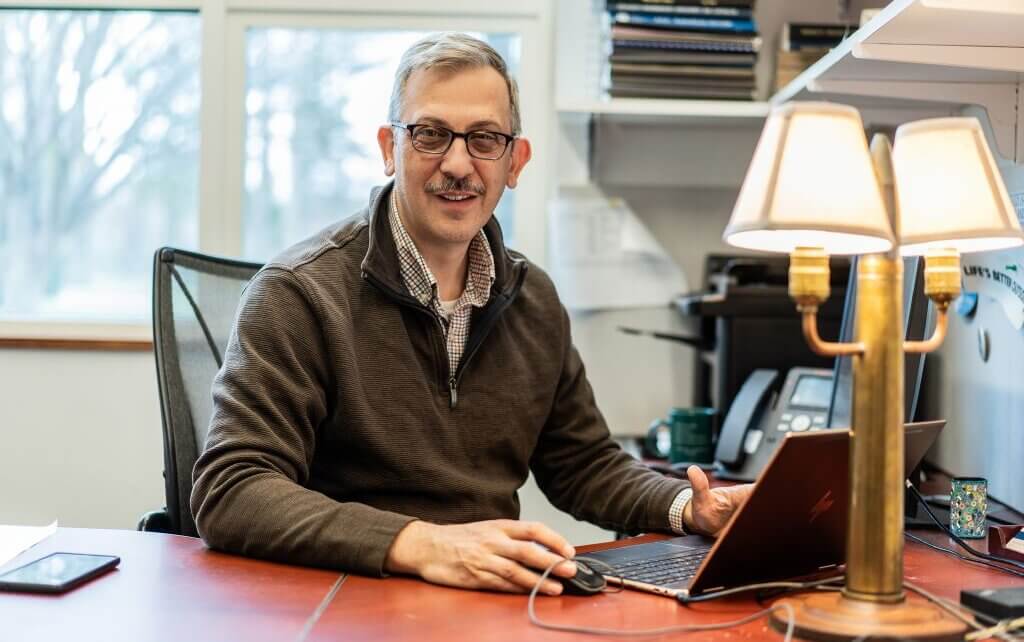Richard Veit, Ph.D., Professor of Anthropology and former Associate Dean of the School of Humanities and Social Sciences, has stepped into the position of Interim Provost this fall.
The job of Interim Provost has responsibilities that spread over the campus for the two years it entails. Patrick Leahy, Ed.D., President of Monmouth, said that Veit will oversee the University’s academic goals as part of its five-year plan, helping showcase the school as a national leader in excellence and creating a personalized academic experience for every student.
Veit’s accomplishments as an educator and leader made an impact on Leahy and the rest of the search committee. During his time at Monmouth, Veit oversaw the largest number of faculty the school had seen and was responsible for hiring new faculty. Veit also engaged in planning initiatives with past provosts and deans.
“I love teaching… it has been a joy, and I love working with students. But, I am also interested in trying to help build the institution and move the institution forward. I took this position because it seemed like a great opportunity to support my colleagues– the faculty here at Monmouth– and to continue moving Monmouth towards a position where we are like the finest private colleges, other than the Ivy’s (Princeton), here in New Jersey,” said Veit.
Veit has plans for continued improvement on campus. He’s taken his first few weeks in this interim Provost position to meet and talk with deans, department chairs, faculty members and union, as well as members of the student government. He wanted to get a sense of where everyone was at, making sure both students and teachers are adequately supported and resourced. “I figured that in order to be the most effective, I would need to know what my colleagues and peers are thinking and to benefit from their good ideas,” he emphasized.
Two of the many people he had spoken to were Johanna Foster, Ph.D., President of Faculty Association (FAMCO), and Pedram Daneshgar, Ph.D., Chair of Faculty Council.
Daneshgar discussed the side of academics for students with the Interim Provost. He and Veit will deal with curriculum changes, general education requirements, new programs, graduation rates, and admission requirements for new students. Daneshgar has been discussing upcoming matters of a winter session, a first-year experience, a policy on artificial intelligence in the classroom, academic re-alignment, online instruction policy, and general education oversight with Veit. These matters take a lot of time and consideration, but, according to Daneshgar, said, “Veit is the ideal academic, excelling at both teaching and scholarship [research], strongly valuing both. He is a passionate person that loves Monmouth. He’s a great role model to all faculty on how to make the most of our time here.”
Foster and the rest of FAMCO will work directly with Veit on matters relating back to faculty, such as sorting out salaries, healthcare or retirement benefits, and conditions of the workplace to ensure safety and health.
“It’s encouraging for the Union to know that with the experience in the classroom that Dr. Veit has, and now in the position of interim Provost, he would bring a clear understanding of the resources that faculty need to do their jobs well, and the kind of challenges that our students are currently facing. We are looking forward to him applying that experience, support, and advocacy to make sure that the learning environment at Monmouth is as top shelf as it can be,” Foster underscored.
When the opportunity presented itself, Veit took his knowledge and experience with colleagues, like Christopher DeRosa, Ph.D., Chair of the History and Anthropology Department, and put it to use. In their time working closely together for the past 20 years, DeRosa commented, “Dr. Veit is a strong believer in Monmouth: he sees us as the second-best private university in the state, and it is exciting to have someone in leadership with that kind of faith in the students and faculty.”
Despite being Interim Provost, Veit is still a professor at Monmouth and teaching a course in New Jersey History. He said, “I may be here for 25 years, but students are here for a much shorter period… four or maybe five years. I think it is so important that they have a great experience and that their time at Monmouth is something that they can talk about positively for the rest of their lives.”
DeRosa concluded, “As Chair in our department, he promoted good-spirited collegiality and modeled tremendous dedication to students. A lot of faculty, I like to think, go the extra mile for students, but Rich goes the extra marathon.”


